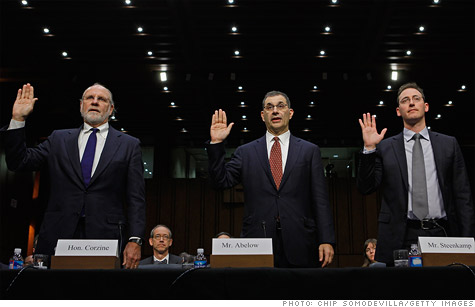Search News

Former New Jersey governor Jon Corzine (left) remains under scrutiny for his role in the MF Global mess.
NEW YORK (CNNMoney) -- It's been more than six weeks since the bankruptcy of Jon Corzine's MF Global, and everyone from the FBI to Congress to frustrated customers is still trying to figure out what exactly went wrong. Here's a quick primer on what happened, what's at stake, and what we know so far:
What did MF Global do? MF Global (MFGLQ) traces its roots back to a sugar trading business founded in 1783. For most of its recent history, the firm operated as a "futures commission merchant," brokering trades in the commodities market.
Farmers and other participants in these markets post collateral to their accounts with firms like MF Global in order to secure futures contracts allowing them to buy or sell a certain product in the future at a predetermined time and price, insulating them from the volatility of the markets. Traders also use the futures market to make money by speculating on commodities prices.
In more recent years, this business became less profitable for MF Global, and in 2010, the board installed former New Jersey governor and senator Jon Corzine as CEO in order to revitalize the firm.
Corzine's plan was to remake MF Global into a "broker-dealer" that traded with its own money and also provided underwriting and advisory services, similar to Goldman Sachs (GS, Fortune 500), where he was once CEO. This business evolved alongside the traditional futures commission merchant arm of the firm.
How did things fall apart so quickly? Anxious to take MF Global to the ranks of Wall Street's elite, Corzine pushed the firm to borrow money and take on big bets on European government debt.
MF Global didn't actually lose money on these bets themselves -- none of the governments whose debt it held have defaulted, and all the firm's bonds were set to mature before 2013. But these risky positions -- and the leverage used to take them on -- sparked a panic among investors when they came to public attention in October.
In essence, MF Global was felled by a classic "run on the bank" -- as news of its risky bets spread, trading partners called for increased margin payments and clients took their business elsewhere, leaving the firm scrambling for cash to make good on its obligations.
Corzine eventually attempted to sell MF Global, but a potential deal was scuttled by the discovery that hundreds of millions worth of customer money, mostly from commodities trading accounts, was unaccounted for. This revelation forced the firm to file for bankruptcy on Oct. 31.
Where's the missing money, and were laws broken? While MF Global's bankruptcy filing was the eighth-largest in U.S. history, the real controversy over the past few weeks has been the missing customer money.
In the commodities market, customer funds entrusted to firms like MF Global are supposed to be sacrosanct, protected even in the event of a bankruptcy. A firm can invest these funds for its own purposes, but only provided that it puts safe forms of collateral in place, such as U.S. government bonds, to keep the value of accounts whole.
If these procedures aren't followed, the use of customer funds for a firm's own purposes is a serious violation of industry rules that may also carry criminal liability. The trustee overseeing the brokerage's liquidation says more than $1.2 billion in customer funds from roughly 38,000 accounts remains missing.
Exchange operator CME Group (CME) says MF Global employees have admitted to CME staff that the firm tapped at least $700 million worth of these funds for its own use in the week before its bankruptcy, apparently without the proper collateral in place. CME head Terry Duffy has also accused MF Global of falsifying its account statements to conceal the shortfall, and claims Corzine knew of at least some transfers from customer accounts.
Corzine has said he never authorized any unlawful transfers from these accounts and does not know how the shortfall came about, learning of it less than 24 hours before MF Global's bankruptcy filing.
"I did not in any way know about the use of customer funds on any loan or transfer," he told a Congressional subcommittee last week. Both he and Duffy were testifying under oath and could be subject to perjury charges if found to have lied in their testimony.
What happens next? Corzine has resigned from MF Global, and more than 1,000 of the firm's employees have lost their jobs since the liquidation process began.
The FBI and federal regulators, meanwhile, are investigating potential wrongdoing in MF Global's final days. Lawmakers on Capitol Hill have already held three hearings on the issue.
MF Global's inability to pay back its customers has strained business for Americans across the country, from big-city traders to heartland farmers. The bankruptcy trustee says he hopes to provide account holders with 72% of what they're owed by the end of the year, but it's not clear how much beyond that will be recovered.
In the case that the accounts aren't made whole, customers will have to join the firm's other creditors in bankruptcy court to try and recover the rest of their money. That's a lengthy process -- one that could take years. ![]()